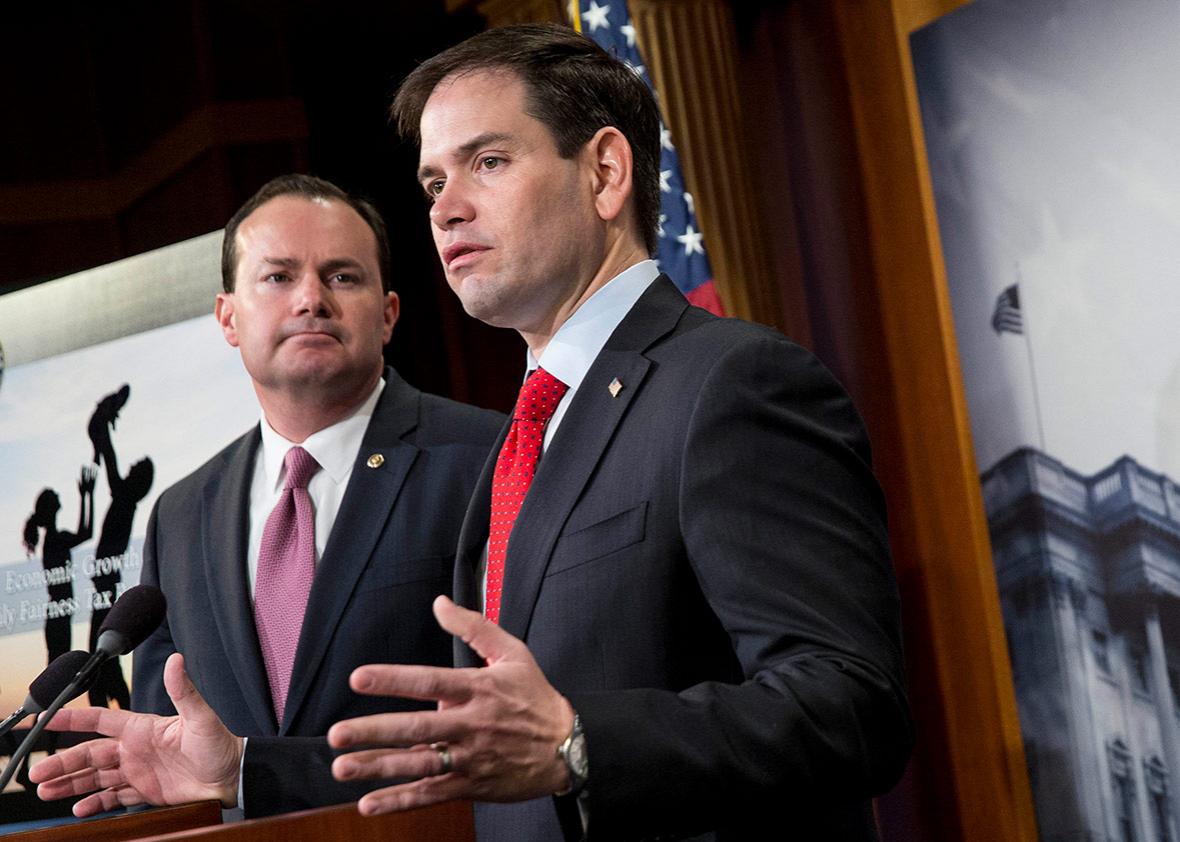Not too long ago, Florida Sen. Marco Rubio and Utah Sen. Mike Lee were conservative darlings. Both of them first ran for the Senate as Tea Party upstarts against Republican insiders, and both distinguished themselves as creative conservative policymakers who were eager to modernize the Reaganite agenda. This week, however, Rubio and Lee have been branded apostates by an alphabet soup of conservative organizations. Their crime? As Jim Newell reports, the two senators are introducing an amendment to the Senate tax bill that would, in essence, cut taxes on corporate profits a tiny bit less in order to reduce the tax burden on low- and middle-income families. Crazy, right?
The Rubio–Lee amendment would cut the corporate tax rate from 35 percent to 22 percent, not 20 percent, to finance making the child credit refundable against payroll taxes. Minor though this might sound, keep in mind that the vast majority of households pay more in payroll taxes than federal income taxes. Howard Gleckman of the Tax Policy Center has observed that families earning between $40,000–$75,000, the heart of the middle class, pay three times more in payroll taxes than they do in federal income taxes. If you don’t make the child credit refundable against payroll taxes, the much-ballyhooed GOP tax cut—the centerpiece of the party’s domestic policy agenda—will do bupkis for millions of families. Far from sabotaging the party’s tax-cut push, Rubio and Lee are trying to rescue it from being an unmitigated political disaster.
If this amendment sounds like a pretty good idea to you, then, well, I’m inclined to agree. But try telling that to the board of Freedom Partners, an influential consortium of conservative donors that has spent hundreds of millions of dollars backing conservative causes and that’s been a key player in the push for a deep cut in the corporate tax rate. These donors fear that if Rubio and Lee get their way on a 22 percent corporate tax rate, pretty soon you might get to a 25 percent corporate tax rate as Susan Collins, Jeff Flake, Bob Corker, Ron Johnson, and who knows how many other senators will have their asks, too. (Recall that the corporate tax rate is now 35 percent, and a cut to 25 percent would still be huge.)
What’s odd, though, is that other dissenting Republicans haven’t been denounced as wild-eyed Bolsheviks when they’ve proposed trading off corporate tax cuts for some other priority. The same can’t be said of Rubio and Lee, who’ve clearly touched a nerve. Why?
From a policy perspective, the senators’ critics argue that they’re jeopardizing the most pro-growth element of the tax bill, and endangering Republican unity, to bribe some of the voters Mitt Romney once wrote off as the 47 percent. I’m skeptical of the claim that the Rubio–Lee amendment will hurt growth. If you really wanted to make the corporate tax code more pro-growth, you’d be far better served by adopting a cash-flow tax, even at a higher rate, than lowering the rate without a larger restructuring of the code. Some economists, such as Larry Summers, warn that the GOP corporate tax plan might actually reduce the incentives of businesses to invest, which would be a disaster. Needless to say, such arguments haven’t gotten much of a hearing from the party’s most prolific donors, who’d likely benefit from the current approach even if it failed to boost overall growth. Summers’s objections were dismissed by many in the GOP as the rantings of a former Obama administration apparatchik, even as they’ve been echoed by many of the more sober economists on the right who worry about the bill’s impact on the deficit.
In the realm of politics, it’s most important to note that Rubio and Lee are opposed by President Trump. Unpopular though the president may be with the wider public, no Republican senator wants to pick a fight with the commander in chief, particularly one who still enjoys the support of the vast majority of Republican voters.
Why have Rubio and Lee chosen to fight on such seemingly unfavorable ground? There are biographical reasons that come to mind. Rubio stands out among his Republican colleagues in having grown up in a lower-middle-class immigrant family in South Florida, where poverty, crime, and fragile families are widespread. Critics might find his frequent invocation of his modest origins cloying, but it’s part of why he’s mindful of how tax legislation might affect people like his father and mother, who worked as a bartender and a maid, respectively.
Lee comes from a more privileged background, but he has a deep and long-standing interest in addressing the root causes of family and community breakdown in part due to his religious convictions. Both Rubio and Lee were sharply critical of Trump during the 2016 presidential campaign, and they’ve both tried to maintain some critical distance since. Yet both of them are open—enthusiastic, even—about melding together conservative and populist ideas. Shortly after Trump’s inauguration, for example, Lee floated an intriguing plan to eliminate the corporate income tax outright (an idea Freedom Partners would no doubt cheer) in exchange for steep increases in capital gains and dividend taxes (the cheering just stopped).
More broadly, though, my guess is that they see their amendment as a way to start preparing for the party’s future. Even if the Rubio–Lee amendment fails, which it very well might, if Rubio and Lee manage to win over even a small number of GOP senators to their banner, they will have identified who among their colleagues is willing to stand with them in putting folks before Kochs. Given the party’s razor-thin majority in the Senate, even a small caucus of populist Republicans could force the party to pay more heed to the working class than the donor class.
